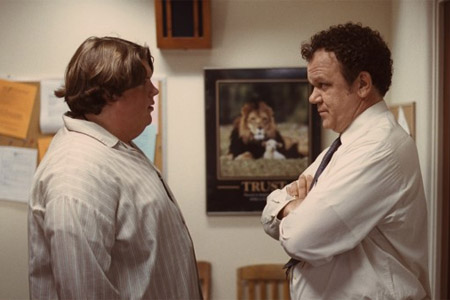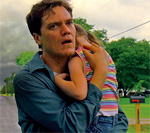
Every critic, from the callow first-time reviewer for a college paper to a household name like Roger Ebert, has the not-so-hidden agenda of steering moviegoers toward worthy films and away from the mediocre, the mendacious and the formulaic. But even Ebert, with a national, Internet-accessible bully pulpit, can’t singlehandedly turn a small film sans movie stars into a mainstream hit. Every year, consequently, several multiplexes’ worth of smartly conceived and well-executed American independent movies slip past the masses, destined for oblivion, cult status or rediscovery a decade or two from now.
Life isn’t fair, but sometimes a measure of justice—a reprieve, if you will—is granted. Ebertfest, the annual film festival founded by the venerable Chicago Sun-Times critic in 1989 and running April 25-29, 2012, has always had the core mission of spotlighting underappreciated films. Held at a landmark 1,500-seat theater in the southern Illinois town of Champaign, where Roger Ebert capped his undergrad career at the University of Illinois as the editor of the student newspaper (The Daily Illini), the four-day festival convenes film buffs and filmmakers in a collegial setting where appreciation of artistic ambition is the order of the day.
“Ambitious” is not the first adjective that typically comes to mind when describing American indies, admittedly. (“Clever,” “earnest,” and “impassioned” rank well ahead.) This Ebertfest’s representatives—Big Fan, Terri and Take Shelter—are unapologetically modest in their settings and locations, but deal with big themes and strive for ambiguous and delicate tones that are hellishly difficult to nail.
At first glance, and even second, we see Paul Aufiero, the 30-something protagonist of Big Fan (screening Thursday, April 26, with writer-director Robert Siegel and actor Patton Oswalt on hand), as not merely a loser, but the worst kind of loser: An adult in ignorance or denial of the obvious fact that his/her life is desperately narrow, shallow and unfulfilling. Paul works in a New York parking garage and lives with his mom; he’s the kind of service employee and nondescript ne’er-do-well who isn’t so much forgettable as invisible.
His sole passion is the New York Giants and his one pleasure is calling in every night to a sports-talk radio program. He takes this activity so seriously that he scripts and rehearses what he’s going to say, pretending (once he’s on the line) that he’s speaking off the cuff.
Paul’s world splinters the night he and a buddy spot the Giants quarterback out on the town and, mesmerized by the sight of their hero in the flesh, follow him into an upscale club. For perhaps the first time in his life, and at the worst possible time, Paul’s cloak of invisibility disappears. A misunderstanding takes place, fueled by a little alcohol and a lot of ego, and the athlete gives Paul a serious whomping that lands him in the hospital.

Paul bleeds Giants blue and red; he doesn’t mind bleeding a little Aufiero red. But for once, his interests and those of the Giants may not be in perfect sync. Should he sue, or press charges against, his team’s star player? More profoundly, what’s going to happen to Paul’s psyche now that he’s encountered the difference between fantasy football and the real world?
One might have expected Big Fan to find a rabid following in New York and every other big city (presumably with the promotional help of sports-talk radio hosts) when it came out in 2009. The young male audience, however, wants straight action, not reflection or a parable of self-awareness. And the arthouse crowd disdains sports movies (unless they’re post-colonial fables from abroad). Patton Oswalt, incidentally, will also be presenting a free, late-night screening at Ebertfest of Kind Hearts and Coronets (1949) starring the incomparable Alec Guinness.
It’s easier to define what ‘Terri’ isn’t than to assess what it is. It’s not a barbed satire of bullying high school, or a neo-realistic portrait of teenage wastelands, or a coming-of-age saga of profound and hard-won self-actualization. Rather it’s a film about the limits of good intentions, and the defining pace of most people’s lives: Two steps forward, one and a half steps back.
The title character of Terri (screening Thursday, April 26, with actor Jacob Wysocki and director Azazel Jacobs, whose wonderful previous film, Momma’s Man, deserved more attention) is an overweight, disaffected high school student with an unsupportive (to say the least) home life. Hapless and benign, he’d have been the butt of the joke if this were a 1950s flick. He’s anything but invisible; in his trademark pajamas, he can’t help but stick out in school. These days we’re conditioned to ask if Terri’s a savant, an artist or some other superior subspecies of the genus Americanus teenager. The answer is none of the above, which complicates our reaction to him and the movie.
It’s easier to define what Terri isn’t than to assess what it is. It’s not a barbed satire of bullying high school, or a neo-realistic portrait of teenage wastelands, or a coming-of-age saga of profound and hard-won self-actualization. Rather it’s a film about the limits of good intentions, and the defining pace of most people’s lives: Two steps forward, one and a half steps back.
Terri is a passive, easygoing sort (which isn’t to say he doesn’t feel pain or embarrassment), so another character is required to fulfill the role of the film’s motor. That would be the assistant principal, played by the quintessentially normal John C. Reilly, who strives willfully but mostly ineffectively to make a specialty of counseling, supporting and motivating the pariahs and hard cases in the student body.
There are several laughs but no flashes of catharsis in Terri, and only a few, fleeting moments of satisfying human connection. We’re not surprised that the movie disdains the staple Hollywood plot points (the meanies getting their comeuppance, the main character revealing his special skills and/or triumphing over adversity, the good-hearted secondary character finding happiness at the end), but it’s still with some surprise and reluctance that we realize that Terri doesn’t move all that far from where we initially encountered him.
Only later, though, does the extent of Terri’s journey hit us. The brilliant writer Graham Greene said, in an altogether different and infinitely more political context, “Innocence is a kind of insanity,” and Terri has agreed to abandon his demented isolation and to accept and integrate with the real world. That is a helluva big deal. The difficult filmmaking trick, which Jacobs pulls off, is for Terri to achieve this transformation without being defeated, without conforming to mainstream expectations (even ours), and without acceding to superficial yet socially acceptable mores. Growth must not be confused with, or the result of, the compromising of principles.
Is he prescient or paranoid? Is he protecting his family, or endangering them? Can we afford to be cavalier observers of Curtis’s wrenching march down the rabbit hole, or should we stop the DVD or stream this instant, log onto the Internet and order materials and supplies for our own family-size fort?
It is precisely an unwavering adherence to his principles and his perceptions that drives the Ohio construction worker at the center of Take Shelter to drastic and seemingly irrational actions. Sensing a coming apocalypse, and resolute about protecting his wife and young daughter, Curtis (the deeply committed and scarily intense Michael Shannon) sets about installing a modern (tornado? fallout?) shelter in his backyard. Is he prescient or paranoid? Is he protecting his family, or endangering them? Can we afford to be cavalier observers of Curtis’s wrenching march down the rabbit hole, or should we stop the DVD or stream this instant, log onto the Internet and order materials and supplies for our own family-size fort?
Writer-director Jeff Nichols gives us a branch to grab a hold of, if we desire it and God knows we do, in the form of Curtis’ mother’s schizophrenia. Our tormented hero recognizes the possibility that he’s inherited her illness, and therefore there’s an explanation for his hallucinations and panic attacks, but he can’t take the risk that he’s not well. His family, after all, depends on him.
Take Shelter (screening Saturday, April 28 with Shannon and Nichols, whose riveting first feature, Shotgun Stories, likewise succinctly and powerfully delineated a place and a state of mind) sustains its mood of ambiguous, unsettling mystery all the way to the last shattering shot. Michael Shannon never turns the movie into a showboating acting showcase; he recognizes that its danger, and power, derives from our dreading the consequences to his daughter and wife (a quietly effective Jessica Chastain)—whether the biggest threat turns out to be Curtis or a storm.
Like Big Fan and Terri, Take Shelter keeps absolute faith with its set-up, its characters and its unsettling, uncomfortable vision. These three films provide powerful snapshots of the fractured, fragmented landscape that is the United States post-post-9/11, reeling from two wars, an economic meltdown and a leadership vacuum. Their moral, to the degree they share one, is embodied in the hard but comforting lesson that Paul, Terri, and Curtis don’t have to deal with this mess, or their problems, alone. A tip of the cap to Ebertfest for reviving a trio of contemporary works that remind us we’re all in this together.




